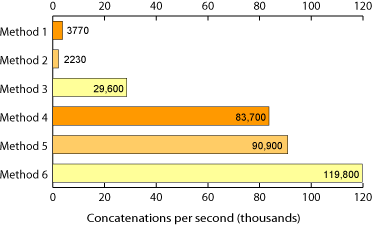How slow is Python's string concatenation vs. str.join?
As a result of the comments in my answer on this thread, I wanted to know what the speed difference is between the += operator and ''.join()
So what is the speed comparison between the two?
From: Efficient String Concatenation
Method 1:
def method1():
out_str = ''
for num in xrange(loop_count):
out_str += 'num'
return out_str
Method 4:
def method4():
str_list = []
for num in xrange(loop_count):
str_list.append('num')
return ''.join(str_list)
Now I realise they are not strictly representative, and the 4th method appends to a list before iterating through and joining each item, but it's a fair indication.
String join is significantly faster then concatenation.
Why? Strings are immutable and can't be changed in place. To alter one, a new representation needs to be created (a concatenation of the two).

The existing answers are very well-written and researched, but here's another answer for the Python 3.6 era, since now we have literal string interpolation (AKA, f-strings):
>>> import timeit
>>> timeit.timeit('f\'{"a"}{"b"}{"c"}\'', number=1000000)
0.14618930302094668
>>> timeit.timeit('"".join(["a", "b", "c"])', number=1000000)
0.23334730707574636
>>> timeit.timeit('a = "a"; a += "b"; a += "c"', number=1000000)
0.14985873899422586
Test performed using CPython 3.6.5 on a 2012 Retina MacBook Pro with an Intel Core i7 at 2.3 GHz.
This is by no means any formal benchmark, but it looks like using f-strings is roughly as performant as using += concatenation; any improved metrics or suggestions are, of course, welcome.